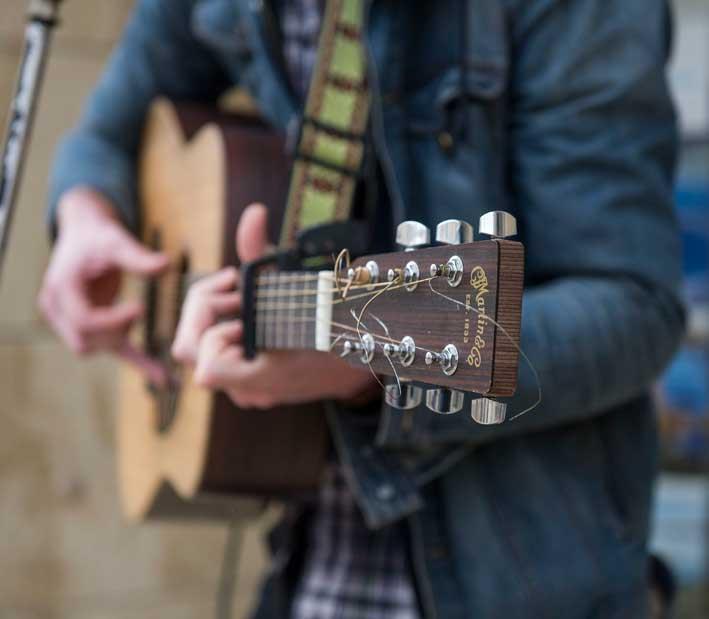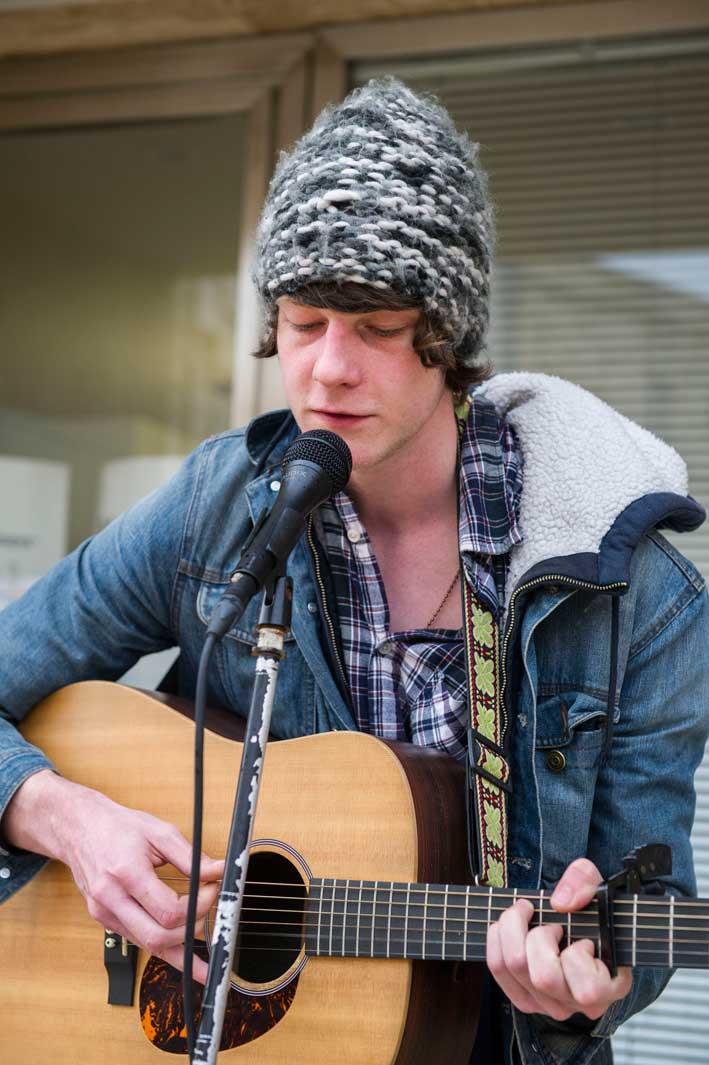A group of talented street buskers arrived in Malta last January and shared their music with us on our streets. Busking... to play music or perform in a public place, usually soliciting money. Love it or hate it, busking has become a visible presence in Western culture.
When I met Andrew Lewis, one of the buskers, he was having one of those days when everything goes wrong and nothing seems to go right. It was pouring and definitely not the best moment for him to show off his musical talent at its best. The rain stopped and we went in search of a location where he could play.
Walking up Republic street, he chose a spot, unpacked his amp... plugged in his mic.... struck a chord on his guitar and... rain began to pour once more, forcing him to pack up and seek shelter. While transferring his equipment, his amp trolley wheel caved and he had to carry the amp and equipment. We found a sheltered location, set-up again and he began to sing. Echoes of James Blunt in his voice - not bad; actually, quite good.

Andrew from Scotland, primarily plays "folk music, however throw[s] in some pop for the audience". The group in Malta primarily came from Denmark and Berlin, he said. He started out when he was about 17 years old and with only five songs in his repertoire, he sought the streets for the first time.
"I played those five songs for a good three hours," he chuckled. "It was actually my dad who drove me to town that day. Parking cost him around £15 and a further £8 for guitar strings. I made around £11 total, so it was a loss of around £12 and that was my first experience with busking. I should note that £2 was given to me by an elderly woman as a token of luck before I began playing".
"I kept playing locally for a few months and a friend of mine urged me to audition for a place in college. I did and I got in. I kept busking to support my tuition fees, however I felt like I wasn't really learning anything." He tried full time employment but this did not work out and Andrew had to leave college as he was unable to pay his tuition fees. Once again, he turned to the streets with his guitar.
Andrew headed to Belgium, then France and ended up in Berlin. Originally he played acoustically, however this changed after he ran into a group of friendly buskers. "They helped me realise that in order to make more money, I needed an amplifier. I got one and instantly tripled my income. This is where I met a man called Stephen Prescott, who's been busking for most of his life". Stephen was the man who told Andrew to come to Malta.
"There are around 30-40 buskers in Berlin and most of us are friends. There's a set of rules we must follow. For example, if we are sharing a spot, each busker would get an hour to play and then move to the back of the queue".
It was Stephen's insistence that brought the other buskers to Malta this year. "The plan was to save around €600 but I doubt I've got more than €80 in my pocket. I managed to pay for my flight back at least".

Busking in Malta
"Maltese people in general are very friendly. However I feel they don't have a culture suited to busking. If the weather Is nice, you'd maybe have 20 or 30 people listening around you; around 200 if you're an exceptionally good busker. However in Malta, it's difficult to get more than five or six people listening to you simultaneously. It can be a bit disheartening but luckily, they pay relatively well... when they do pay. As an audience, they're not great; however as a people, they're possibly the friendliest I've ever met while travelling".
Andrew made some interesting comments about our youths. His perspective offers food for thought. He has been wandering about for around three weeks. "The youth in Malta seem to be very arrogant. I've seen ten year olds smoking, I've had water bottles thrown at me and a friend of mine had a rubbish bag upturned onto him from a height. I think it's because they don't have much to do and so they spend their time causing trouble. This really confuses me, as almost every adult I've met has been incredibly polite, friendly and welcoming. Is there a transition from being a child to being an adult where children in Malta become pleasant people or is it a generational thing? Some of the kids throw rubbish into the case and laugh like it's a really good joke, while some would throw ten cents and think it's quite funny. At the end of the day, it's my ten cents now".
Asked whether buskers 'claim territory' when in a city, Andrew said that there's no claim, however depending on the person and musical style, each busker might be better suited to a certain spot. "I'm quite inclined to go for smaller areas, where people are forced to walk past me, so it really depends on the person".
He said that the only legal place to busk in Malta is Valletta. "It's best to stick with the rules of a city or country, otherwise we risk being fined. We play here because we are allowed to play here and we are pretty sure we are not allowed to play anywhere else".
Currently, Andrew is trying to save up enough money to record a studio album. He then hopes to get a booking agent and maybe organise a small tour around Europe. "I don't have any real ambition to become a musician. I do this because it's easier than a real job. Although I must stress that this is still a job because I work every day, even in the rain".
"I know of a busker in Berlin who received a record contract and has supported some known bands. So it is possible to move away from the street, although she doesn't really want to, as she makes enough money busking".
"I reckon it would be close to impossible to support yourself as a busker in Malta during the winter period as there are not enough people. In summer, I've heard the population triples because of the number of tourists... and tourists are always great for money. If you're good enough, have the right equipment, the right attitude and treat it like a normal job, then you can make more than enough money. "
"If you can play and sing, you can pretty much succeed anywhere, as long as it isn't against the law. And if it is against the law, just ask the police in advance and usually it is fine. The only issue with travelling is that if you have a lot of equipment it can cost quite a bit to fly."

Playing in undergrounds
Buskers are quite prominent in undergrounds in major European cities, yet Andrew argues that when playing in those places, people tend to "look at you as a beggar, not a busker. You can still make money, but its 'pity money'. It's got a completely different vibe to it; you feel like you're begging and not playing for people. I think most of the buskers who play in undergrounds play the accordion or string instruments. It's not that they're not great; it's that such instruments are more suited to small places. There's a stereotype people have of buskers in the underground, so if you play there, you're automatically filed under that category and I wouldn't recommend it if you want to take busking seriously. Of course, this depends on the place and the weather".
"It takes a little while to get used to a new place and the energy people want to feel. However, once you click with a place and receive some positive feedback, then it makes a huge difference".
Of course, facing the elements presents a problem and it was surprising to hear that rain is surpassed by wind in a busker's tale of woes. "It blows your CDs away" and I think, more importantly, "your money and equipment away too."
Andrew is heading back to Berlin for now, however plans to travel to Copenhagen in the near future.
Pictures: James Bianchi